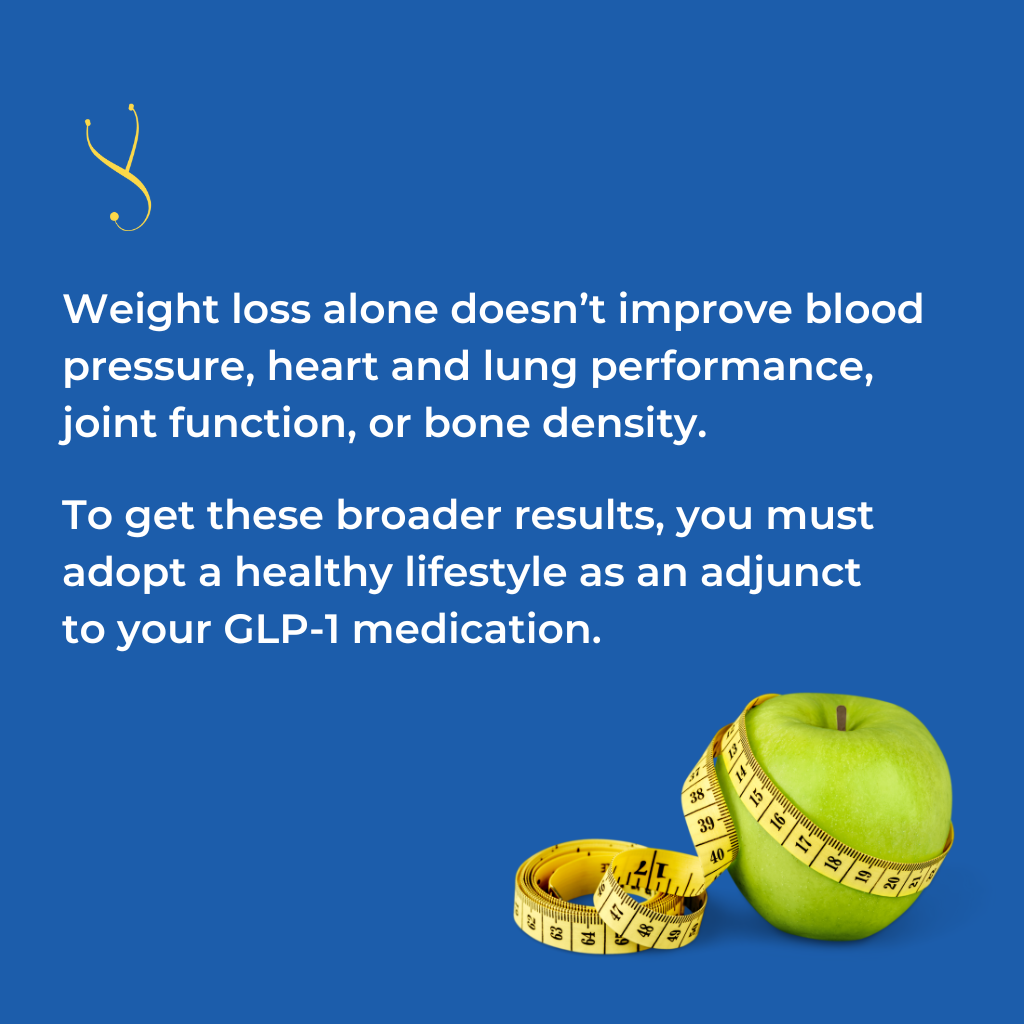Are GLP-1 Medications Alone Enough to Help You?
For decades, weight-loss drugs were largely disappointing. They helped people lose weight, but as soon as the medication was stopped, the pounds came right back.
Then, in 2023, we saw a powerful breakthrough. A class of drugs known as glucagon-like peptide 1 (GLP-1) agonists, developed 20 years ago to treat diabetes, hit the market rebranded as weight-loss drugs.
GLP-1 medications like Mounjaro and Ozempic set the weight loss bar higher, enabling patients to shed as much as 15% of their total body weight within a year. And so far, it appears that the pounds stay off.
But are GLP-1s potent enough to ensure your overall health? Or is something more needed?
The ‘Easy Button’
Modern medicine is amazing. It’s almost an “easy button” for solving our ills.
Unfortunately, when we’re prescribed medicine, we often get complacent about the baggage of an unhealthy lifestyle — our excess weight, high cholesterol, and cardiovascular issues. We figure we’ll just fix it with GLP-1s or statins. In one survey of middle-aged men with cholesterol issues, respondents saw their statins as a green light to eat whatever they wanted, because they believed their drugs were doing all the heavy lifting.
Except for a few weight-related conditions (e.g., arthritis, sleep apnea), it’s controversial whether excess weight is actually a health hazard. What’s hazardous are the lifestyle practices that make you overweight — the same habits that promote cardiovascular disease, cancer, and a host of other illnesses.
A very effective GLP-1 agonist eliminates your excess weight. But that doesn’t necessarily mean you’re healthy.
For positive overall health, you need to do more.
The Essentials: Diet and Exercise
Mounjaro and other variations on GLP-1 agonists aren’t a substitute for proper diet and regular exercise, the dynamic duo of excellent health.
Diet and exercise work in tandem. No amount of exercise will overcome a bad diet. But neither will any pill.
Mounjaro and other GLP-1 agonists reduce your appetite, so you’ll certainly lose weight. They lower blood sugar and triglycerides and improve metabolic function, so diabetes or prediabetes improves. Patients expect miraculous results, and their doctors may neglect to emphasize the need to eat nutritionally and keep the body moving.
Weight loss alone doesn’t improve blood pressure, heart and lung performance, joint function, or bone density. To get these broader results, you must adopt a healthy lifestyle as an adjunct to your GLP-1 medication.
GLP-1 medications are (at least so far) approved for long-term use. But you don’t want to rely on them forever. By adopting healthy lifestyle changes, the goal is that you’ll be able to reduce the dose and the dosing frequency of your GLP-1 agonist.

What a Healthy Lifestyle Does
Weight loss via GLP-1 agonists can be life-changing. But proper diet, consistent exercise, and good sleep habits bring you the gains that GLP-1s can’t:
Diet and Nutrition
GLP-1s help you eat less. But eating less isn’t the same as eating healthfully.
Reducing calories encourages weight loss, but the quality of those calories is vital to your nutrition and wellness. Say you consume fewer calories, but they’re in the form of candy bars. You may keep the weight off, but you’re not on the path to nutritional health.
Your doctor or nutritionist can advise you on a well-rounded diet that includes essential macronutrients (fats, carbohydrates, and protein) and key micronutrients (vitamins and minerals). Among its many benefits, balanced eating can:
- Resolve anemia
- Lower dangerous cholesterol levels
- Promote cardiovascular health
- Decrease cancer risk
And, though your genetics play a role in some of your health conditions, you can better manage and control them if you eat right.

Exercise and Regular Activity
Your blood vessels aren’t just pipes that transit blood. They’re active organs, secreting hormones, proteins, and other substances necessary for blood vessel health. Exercise has a positive effect on vascular compliance, the blood vessels’ response to increases in blood pressure.
Sitting all day is the new smoking. It causes the blood vessels to secrete substances that are pro-inflammatory and encourage clots. Even exercise can’t easily overcome the negative effects of being sedentary all day.
In one study, a group of participants sat all day at work and all night at home; a second group was sedentary by day but exercised in the evening. Metabolic health was the same for both groups.
Even when adults stick to a regular exercise schedule, prolonged periods of inactivity can sabotage their health. In another study, it took over an hour of moderate-intensity exercise every day to overcome the unhealthy effects of sitting at a desk all day.
Using GLP-1 medications for weight loss won’t counteract sitting disease. Our bodies need regular activity and movement.
The benefits of regular activity are impressive. Active people typically enjoy better emotional health and cognitive well-being and a decreased risk of heart disease, diabetes, and dementia. And regular weight-bearing exercise encourages good bone density.
Sleep
Sleep deprivation unleashes a vicious cycle of hormonal changes that promote obesity.
If you don’t carve out enough time to sleep, or if your sleep isn’t of good quality, hormones that cause weight gain surge through your body. Chronic sleep deprivation puts the body in stress mode, making you crave calories. Excess weight can also promote sleep apnea, so the cycle of sleep deprivation continues.
GLP-1 medications counteract some of these hormonal effects, so you still lose unwanted weight. But another area where GLP-1s can’t help is brain health. You need quality sleep to protect against dementia and memory loss.
Stay Disciplined
GLP-1 medications are the most promising tool we have today for sustained weight loss.
However, if your only goal is to lose weight, you may still have health risks. So stay disciplined about the things that support your medication’s work. Good nutrition, an active lifestyle, and proper sleep hygiene bring great results your GLP-1 can’t.
Your Signature Healthcare team can help you explore how GLP-1 medications, when paired with lifestyle modifications, can be a smart road to excellent health. Reach out.

Dr. Marshall Silverman
Dr. Marshall Silverman, MD, a board-certified internal medicine specialist with over two decades of experience in Charlotte, combines his clinical role with academic pursuits as a clinical associate professor at UNC-Chapel Hill. His diverse interests span from disc golfing and woodworking to playing the violin and authoring illustrated children’s poetry books, reflecting a unique blend of medical professionalism and creative expression.
Get the latest News
Join the Signature Healthcare Newsletter to get the latest articles, resources, and news delivered directly to your inbox.

